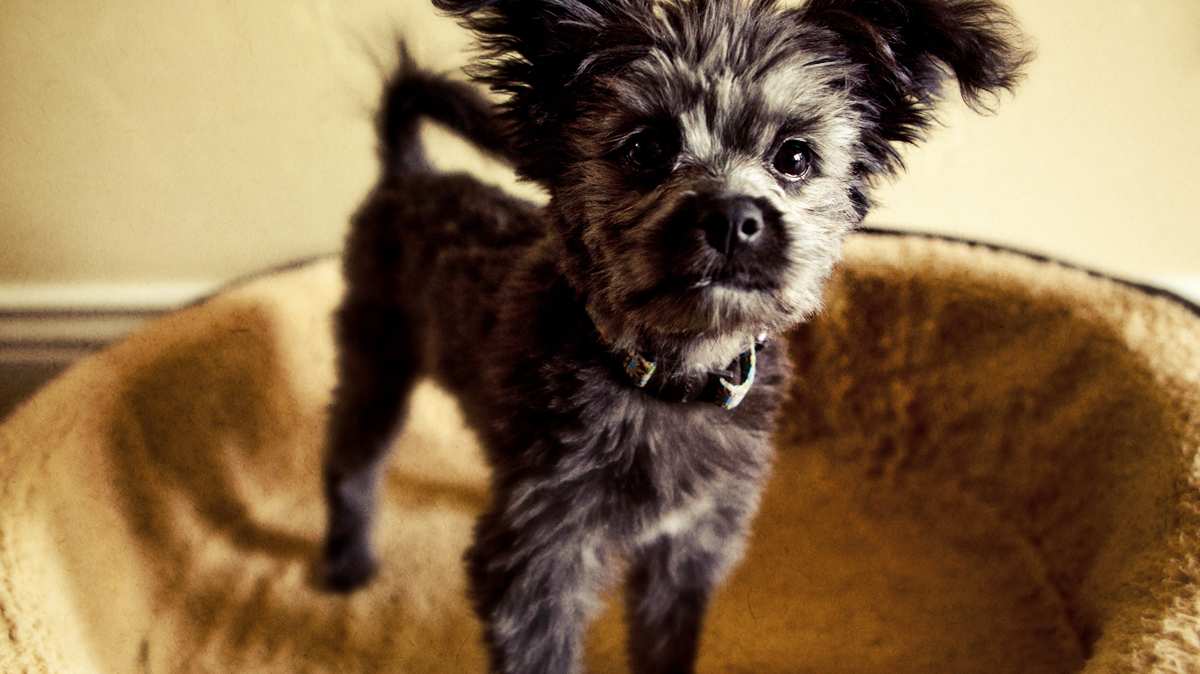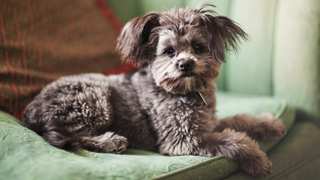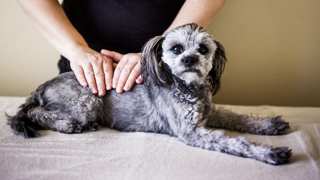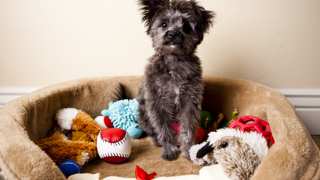Yo-Yopoo
Yorkie Poo
Yorkie Poodle
Yorkiedoodle
Yorkshire Terrier Poodle
Pronounced: YOR-kee POO
The Yorkiepoo is a small-sized hybrid dog bred from crossing a Yorkshire Terrier with either a Toy or Miniature Poodle. Since they are hybrids, they will acquire the characteristics of both parent breeds. Not all Yorkiepoos will inherit the same characteristics, however (even those from the same litter); some will get more Yorkshire Terrier, some will get more Poodle and still others will have a balanced mix of both parent breeds. It's strongly recommended that you become familiar with both breeds if you plan on adopting a Yorkiepoo.
Yorkiepoos are very energetic dogs whose stamina, barking and ability to leap high may startle those expecting a small dog to be easy to manage. They require lots of patient training when they are young, a good amount of exercise as they mature (and afterward) and a family that is willing to play along all the time. They are suitable for small apartments but can easily adapt to large homes with high-fenced yards in which to play. Although they are little dogs, they tend to forget this, and along with their remarkable intelligence, they may be a bit obstinate.
The Yorkie-Poo is a hybrid dog produced from cross-breeding the Yorkshire Terrier with the Toy Poodle. It is a small, cute designer dog bred to marry the affection and enthusiastic demeanor of the Yorkshire Terrier's intelligent, easy trainability with the hypo-allergenic, very low-shedding coat of the Toy Poodle.
Pros
- Always ready to be the center of attention
- Easy to travel and comfortable with being held
- Highly adaptable to small apartments
- Comfortable with large home with many other pets
- Very few health concerns
- Low grooming maintenance
- Recognized by the registries ACHC, DDKC, DRA, IDCR and DBR.
Cons
- Remarkable intelligence can be the basis for stubborn attitude
- May be difficult to house train
- Skin allergies
- Ear infections
- Eye problems
- Doesn't know she's a small dog
Hybrid
12 - 15 yrs.
7 - 15 in.
3 - 14 lbs
OverallFamily FriendlyChild FriendlyPet FriendlyStranger Friendly
Easy to GroomEnergy LevelExercise NeedsHealthShedding Amount
Barks / HowlsEasy to TrainGuard DogPlayfulnessWatch Dog
Apartment DogCan be AloneGood for Busy OwnersGood for New OwnersIntelligence
Yorkiepoo Breed Description
Your Yorki-Poo may be a cross-breed, but he comes from two highly intelligent breeds with their own hard-working and centuries-old historical backgrounds. Yorkie-Poo information is not difficult to divine, if you look into Yorkshire Terriers and Poodles.
As Poodle hybrids tend to be the most popular of recent designer dog mixes, and Yorkshire Terriers are small dogs with significant histories that go back several centuries as reliable hunting dogs, this mix is one that even the American kennel Club (AKC) has begun to recognize, as exhibited on their Web site regarding the dog.
Yorki-Poos are very active dogs who may get a fair amount of in-door exercise but still require a short daily walk. They have a lot of curiosity, may tend to jump a great amount — which can be curbed when they are pups — and will be happy to be your companion all day long!
The Yorkie poo is a relatively new designer dog that has gained popularity over the last decade. Because they haven't been around long, there is not much history for this hybrid, but as they are crossbred from two pure breeds — the Yorkshire Terrier and either the Toy or Miniature Poodle — with significant histories, learning about the two parent breeds will help you understand the your Yorkie poo.
The Yorkshire Terrier is about 100 years old and comes from a mix of earlier regional Terriers from England and Scotland, all of which were frequently used to root out rats by miners and other working class people of the Industrial Era. Originally called the "Broken-haired Scotch Terrier," they were not named Yorkshire Terrier until 1874 after a remarkable progression during several dog shows starting in 1861. By the 1870's, they were being exported to America, and in 1878, the American Kennel Club (AKC) formally recognized the breed. Yorkshire Terriers quickly became sought by royalty during the Victorian era and as a result were soon perceived widely as companion animals rather than hunters. Since then, they have become extremely popular and may be found in great numbers in not only the UK and U.S. but also in Australia, South Africa and Italy.
Although the Poodle has a much longer and deeper history, the Toy and Miniature Poodles have only been around since the 18th century. French and possibly German royalty had the Standard Poodle bred down for size, and eventually the Toy and Miniature Poodle varieties became recognized — albeit primarily among French ladies of the aristocracy. These smaller Poodles had the hunter instinct of their much larger forebears but were easier to manage as well as more domesticated. While the AKC formally recognized the Poodle in 1887, it should be noted that Toy, Miniature and Standard Poodles are varieties within the breed.
Yorkie poos are small dogs whose often short torsos whose small size belies their big nature: they usually try to stand much taller than their short small bodies will allow! There are those, however, that may have have longer torsos and snouts; these Yorkie poos may have been breed with the larger of the two small Poodle varieties, the Miniature Poodle.
They have somewhat large heads (for their body size), short- to medium-length snouts, medium-length floppy ears (usually; there are some whose large, triangular ears will partially stand up) and black eyes that beam with an inquisitiveness. They nearly always have short legs too, but if they have a predominance of Poodle, they may have relative long, spindly legs. Many have a slight overbite, and most will have their tail docked.
The Yorkie poo's coat can vary from silky, soft and long like a Yorkshire Terrier to curly and slightly coarse like a Poodle's or anywhere where between.
The images below represent the coat colors and patterns associated with Yorkiepoos.
Sable
There are four Yorkie poo variations acknowledged. The topmost one is the F1, which is 50 percent Yorkshire Terrier and 50 percent Poodle. These are first-generation puppies, and they are believed to be the generation with the fewest health concerns. F1-B is either 75 percent Yorkshire Terrier and 25 percent Poodle or 75 percent Poodle and 25 percent Yorkshire Terrier. Then there is F2 which is when two F1 Yorkie poos are cross-bred, and finally there is F3 — which is when two F2s are crossbred. Due to the desire for toy Yorkie poos and miniatures too, you should make sure you know the variation history of the Yorkie poo you wish to adopt.
Then there is the size variation, and perhaps the most popular but least easy to find is the Teacup Yorkie poo — a very tiny dog that has been downbred from the smallest Yorkies and Toy Poodles and which tends to stand no more than 10" tall. These petite pups are often pictured sitting inside hats that appear to be giant stage props, or Instagrammed in owner's hands in such a way as to make them look impossibly small. Make no doubt, however, that these dogs are remarkably diminutive in size.
The Yorkie poo temperament is best described as intelligent, eager and playful on one hand — and obstinate, constant barkers and perpetually desirous of exercise and attention on the other hand. They should be trained and socialized very early on to curb their barking and jumping habits, and you should be ready to almost always accompany them (and let them accompany you!) as well as see that they get their daily exercise and regular visits to the dog park.
Your Yorkie poo has a relatively hypoallergenic coat that makes him a very low-shedder, but that doesn't mean that his grooming needs are also very low. His coat will grow non-stop and that means two basic things: frequent brushing (to prevent matting as well as to brush out the dead hair) and a few annual trips to the groomer for trimming.
There are also the health concerns that, despite the cross-breeding that eliminates — or at least mitigates — the many health concerns of the two parent breeds, remain to be anticipated: skin allergies, eye problems and ear infections. A Yorkie poo's teeth should also be watched and washed; there are noted problems attributed to down-bred dogs, especially the tiny Toy varieties. A universal concern are the nails: if you hear a constant clicking when your dog walks on concrete, tile or hardwood floors, then it's time for a trim.
Your Yorkie poo has a relatively hypoallergenic coat that makes him a very low-shedder, but that doesn't mean that his grooming needs are also very low. His coat will grow non-stop and that means two basic things: frequent brushing (to prevent matting as well as to brush out the dead hair) and a few annual trips to the groomer for trimming.
There are also the health concerns that, despite the cross-breeding that eliminates — or at least mitigates — the many health concerns of the two parent breeds, remain to be anticipated: skin allergies, eye problems and ear infections. A Yorkie poo's teeth should also be watched and washed; there are noted problems attributed to down-bred dogs, especially the tiny Toy varieties. A universal concern are the nails: if you hear a constant clicking when your dog walks on concrete, tile or hardwood floors, then it's time for a trim.
Making sure your Yorkie poo gets enough exercise is a moderate daily task — but it shouldn't seem so. Short daily walks are practically mandatory even as she will get a fair amount of exercise inside and on her own. You should also have some chew toys for fun, time to do some agility exercise (balls, Frisbees, etc.) and be comfortable with a lot of companion time; Yorkie poos don't like to be left alone for long periods of time and can develop destructive behavior (barking, chewing on furniture) if they left alone.
Yorkie poos are enthusiastic, eager to please and prone to barking a lot. There over-stimulation and barking may be mitigated with early, patient and proper training however, and this is best done with positive reinforcement training methods. They do not do well with crate-training, and they may have separation anxiety if left alone for long periods of time — which will usually lead to incessant barking and destructive behavior.
Small apartments are fine for Yorkie poos so long as they get daily exercise. While they are not outdoor dogs, having a large, well-fenced yard (they are jumpers!) is very good for them for play.
The Yorkie poo is a very low shedder and is considered hypoallergenic. They are good dogs for people who may have allergies to animal dander.
Like most hybrids, Yorkie poos have far less chance for health issues. Still, there are a handful of problems to watch out for: joint dysplasia and related concerns, skin allergies, epilepsy, and ear and eye infections.
The typical life expectancy for your Yorkie poo is about 12 to 15 years.
Yorkiepoo Health Concerns
Below are potential health concerns associated with Yorkiepoos.
Hip dysplasia
Ear infections
Patellar luxation
Progressive retinal atrophy
Epilepsy
Skin allergies
Eye infections












